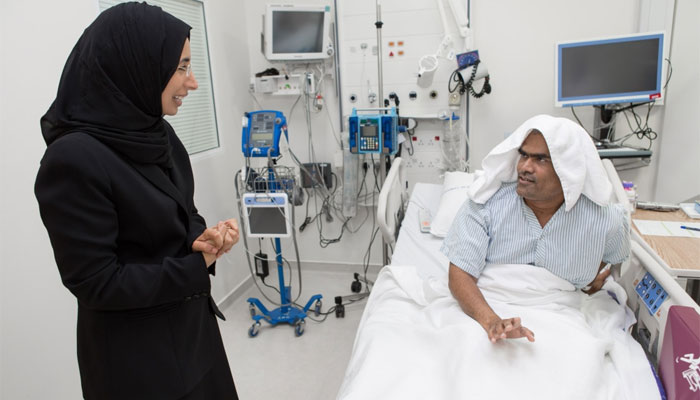HMC managing director Dr Hanan al-Kuwari exchanging pleasantries with one of the two patients who successfully underwent the first stem cell transplants in Qatar
By Joey Aguilar/Staff Reporter
Hamad Medical Corporation (HMC) has achieved yet another milestone by successfully completing the first stem cell transplants in Qatar, it was announced Tuesday.
The procedures benefited two expatriates who had an aggressive form of cancer called ‘myeloma', that affects cells in the bone. Considered as a major development for Qatar in treating blood cancers, the entire procedure was done by a highly specialised team of clinicians at HMC's National Centre for Cancer Care and Research (NCCCR).
The team had been trained extensively on bone marrow transplant and worked with top medical institutions in the world.
“We made a tremendous step forward and this will ensure in the future that treatment which is available only abroad is also offered here to our Qatari and expatriate population,” Prof Alexander Knuth, medical director at NCCCR, told a press conference yesterday.
The team followed the international standards as outlined by the Joint Accreditation Committee of International Society for Cellular Therapies and the European Bone Marrow Transplant Organisation where Qatar is a member now.
"The aim is to establish a Transplant Centre of Excellence for the treatment of cancer in Qatar and the wider Gulf region," Prof Knuth explained.
NCCCR performs the autologous transplant which uses the patient’s own stem cell for transplant. It is also known as a highly effective therapy and the only hope for a cure for people with blood cancer similar to another type of procedure called allogeneic transplant.
For allogeneic, Prof Knuth explained that stem cells come from a different individual (or donor) than from the patient.
“Initially when we were launching this programme we were also debating whether we will start with allogeneic versus autologous but we decided to take the latter because it was easier for it to establish at this time,” he said.
The entire procedure started by eliminating the cancer from the two patients and after complete remission of the disease, autologous transplant followed.
In Qatar, the NCCCR recorded about 500 people – an average of 160 cases per year – who have blood cancers (Qataris and non-Qataris) in the past three years and are candidates for the treatment.
Approximately 30 cases can be treated with autologous transplant annually. Currently, NCCCR’s list has 16 to 17 patients but this keeps changing from time to time.
Prof Knuth said some patients were added while others had been removed from the list depending on their condition.
The disease is more prevalent among adults (90%) than children (10%), he stressed but cases would still depend on the type of disease since some blood cancers are predominantly among children, which are usually lymphatic.
While the percentage is regarded as a very small minority of children, NCCCR plans to create a paediatric programme for its second phase.
“First we establish the adult programme and when all is running well and receives proper accreditation then we will move into the other components,” Prof Knuth said.
The stem cell transplant centre at NCCCR features state-of-the-art equipment and a specialised ward lauded by many visitors from abroad.
For the past few years, HMC had been working on the development of the stem cell transplant programme in Qatar.
Instead of travelling abroad to seek medical treatment, HMC managing director Dr Hanan al-Kuwari said patients can stay in Qatar and benefit from this type of advanced treatment. Recovery time, as well as the risk of infection, is less.
“Development of programmes like this is so important because it helps us deliver the safest, most effective care for our patients – we want to make sure they are given the best possible opportunity for a long and healthy life,” she noted.

